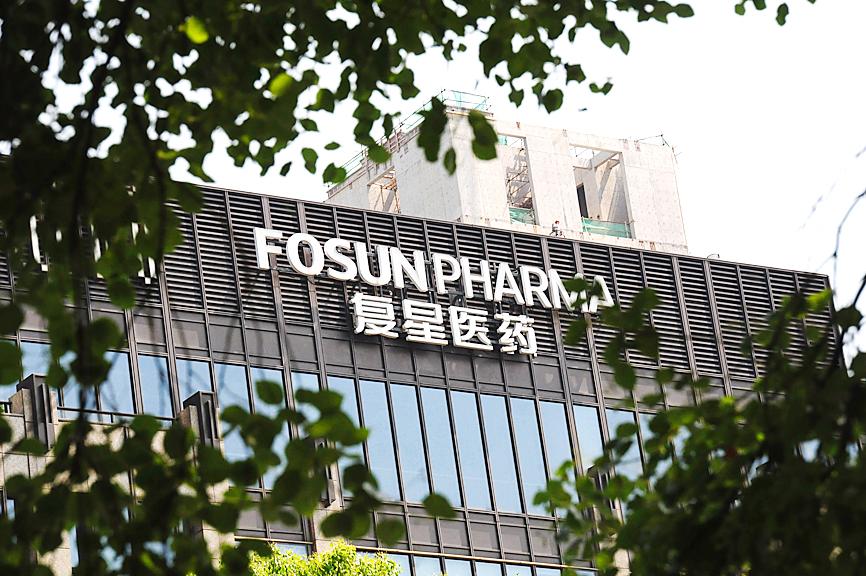Beijing has been encouraging Taiwanese organizations to purchase Pfizer-BioNTech COVID-19 vaccines through Shanghai Fosun Pharmaceutical Group to give the impression that all vaccines received by Taiwanese after this summer came from China, industry sources said yesterday.
Chinese officials are urging groups to follow the example of Taiwan Semiconductor Manufacturing Co and Hon Hai Precision Industry Co, which are looking to purchase millions of doses through a subsidiary of the Chinese company, they said.
Shanghai Fosun has a contract with Germany’s BioNTech to sell the vaccine in Taiwan, China, Hong Kong and Macau.

Photo: CNA
The Chinese National Association of Industry and Commerce reportedly scheduled a meeting with the Ministry of Health and Welfare on June 21 to discuss purchasing 2.5 million doses of the Pfizer-BioNTech vaccine for companies “following the Hon Hai model,” an insider said.
Although the meeting was canceled, the trade group in preliminary discussions hinted at the possibility of eliminating the government’s role in negotiations, including replacing original manufacturer authorization with documentation from a commercial agent, they said.
However, a source with knowledge of the process said that the proposal shows an obvious misunderstanding of the legal process behind vaccine procurement.
Because the association did not plan to donate the vaccines to the government, its application had been put on hold, they added.
When the association first proposed purchasing vaccines, it did so out of concern that a vaccine shortage would affect the industry, but did not indicate how or from whom it would purchase them, an official with knowledge of the matter said.
Association representatives in a meeting with President Tsai Ing-wen (蔡英文) also expressed a general understanding of the complexity of international vaccine procurement and the need for government intervention, they added.
However, an industry source said that a key figure in the Chinese Nationalist Party (KMT) last month approached the association to suggest that it purchase doses from Shanghai Fosun through Missioncare Group.
KMT-run local governments also proposed purchasing vaccines through the association, reportedly suggesting that they hold a joint news conference to submit their proposal to the ministry, they added.
The KMT believes that including industry representatives could dilute the impression that the party is insisting on procuring vaccines from Shanghai Fosun, the source said.

Alain Robert, known as the "French Spider-Man," praised Alex Honnold as exceptionally well-prepared after the US climber completed a free solo ascent of Taipei 101 yesterday. Robert said Honnold's ascent of the 508m-tall skyscraper in just more than one-and-a-half hours without using safety ropes or equipment was a remarkable achievement. "This is my life," he said in an interview conducted in French, adding that he liked the feeling of being "on the edge of danger." The 63-year-old Frenchman climbed Taipei 101 using ropes in December 2004, taking about four hours to reach the top. On a one-to-10 scale of difficulty, Robert said Taipei 101

Nipah virus infection is to be officially listed as a category 5 notifiable infectious disease in Taiwan in March, while clinical treatment guidelines are being formulated, the Centers for Disease Control (CDC) said yesterday. With Nipah infections being reported in other countries and considering its relatively high fatality rate, the centers on Jan. 16 announced that it would be listed as a notifiable infectious disease to bolster the nation’s systematic early warning system and increase public awareness, the CDC said. Bangladesh reported four fatal cases last year in separate districts, with three linked to raw date palm sap consumption, CDC Epidemic Intelligence

Two Taiwanese prosecutors were questioned by Chinese security personnel at their hotel during a trip to China’s Henan Province this month, the Mainland Affairs Council (MAC) said yesterday. The officers had personal information on the prosecutors, including “when they were assigned to their posts, their work locations and job titles,” MAC Deputy Minister and spokesman Liang Wen-chieh (梁文傑) said. On top of asking about their agencies and positions, the officers also questioned the prosecutors about the Cross-Strait Joint Crime-Fighting and Judicial Mutual Assistance Agreement, a pact that serves as the framework for Taiwan-China cooperation on combating crime and providing judicial assistance, Liang

US climber Alex Honnold left Taiwan this morning a day after completing a free-solo ascent of Taipei 101, a feat that drew cheers from onlookers and gained widespread international attention. Honnold yesterday scaled the 101-story skyscraper without a rope or safety harness. The climb — the highest urban free-solo ascent ever attempted — took just more than 90 minutes and was streamed live on Netflix. It was covered by major international news outlets including CNN, the New York Times, the Guardian and the Wall Street Journal. As Honnold prepared to leave Taiwan today, he attracted a crowd when he and his wife, Sanni,